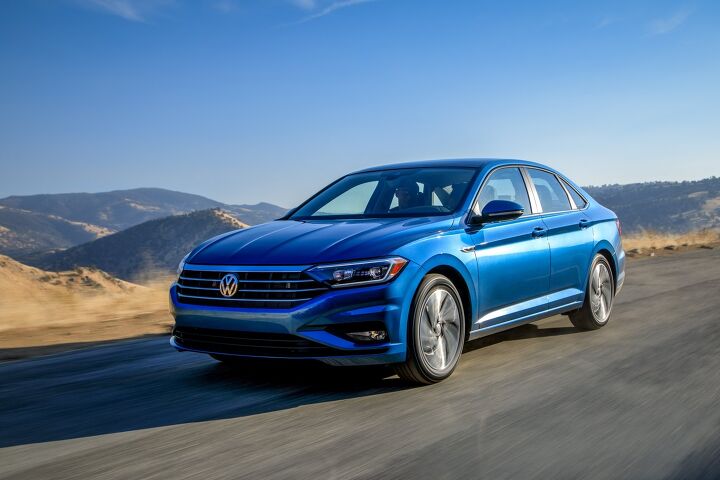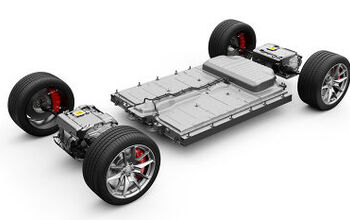Already a Gas Sipper, the 2019 Volkswagen Jetta's Fuel Economy Nears the Head of the Class

The next-generation Jetta, now virtually indistinguishable from other cars when viewed from the side (but unmistakably Volkswagen in its front and rear styling), has plenty of newness on offer, having switched to the company’s MQB platform for the 2019 model year.
Along with a stretch in wheelbase, the new Jetta gains expanded passenger volume and updated features, though not an updated engine. The well-regarded 1.4-liter TSI turbocharged four-cylinder carries over to the seventh-generation model, making 147 horsepower and 184 lb-ft of torque, but a brace of new transmissions arrive to bump the compact sedan’s fuel economy to new (gas-powered) heights.
Now that the EPA has posted figures for the 2019 model, we know the new Jetta is good for 30 miles per gallon in the city, 40 mpg on the highway, and 34 mpg in the combined cycle, both with the new eight-speed automatic and the six-speed manual. Previously, the Jetta was good for 28 city/38 highway/32 combined when paired with a six-speed autobox, and 28 city/40 highway/33 with a five-speed stick.
Having a 40 mpg figure to boast about is a gold mine for the marketing department, as not many automakers field a non-diesel, non-hybrid car that offers such thrift. With VW’s “clean” diesels now a fading memory, squeezing out an extra MPG or two becomes all the more important. Volkswagen can’t be seen as an environmental laggard, future electric car plans be damned.
But how does the new Jetta’s fuel economy stack up against its rivals? Quite favorably, but it’s still not good enough to carry a “class-leading” banner.
As it turns out, the Jetta ties for third. Its MPGs match a number of solely ICE-powered 2018 model year vehicles, including the Toyota Corolla Eco and Ford Focus (when equipped with the optional 1.0-liter EcoBoost three-cylinder). While Chevrolet’s Cruze matches the VW’s highway figure, you’d have to fork over plenty of cash for an internal combustion Cruze that beats it in every way, because that car is a diesel. The Hyundai Elantra Eco, a little-talked-about 1.4-liter variant of the already efficient sedan, beats this crop of compacts in combined fuel economy (35 mpg) without resorting to electrification or compression ignition.
However, it’s the segment’s best-selling model, the Honda Civic, that holds the compact-class fuel economy crown. When equipped with the 1.5-liter turbocharged inline-four and continuously variable automatic, the Civic earns a 36 mpg combined rating. Truly, the car that has everything.
Still, mileage figures aren’t price, and the Jetta — marked for a window sticker reduction for 2019 — offers its top fuel economy to entry-level buyers. No need to upgrade to a higher trim, optional engine, or pricier transmission to see that extra range. The 2019 Jetta should mosey onto U.S. dealer lots in the second quarter of this year.
[Image: Volkswagen of America]

More by Steph Willems
Latest Car Reviews
Read moreLatest Product Reviews
Read moreRecent Comments
- Flashindapan Will I miss the Malibu, no. Will I miss one less midsize sedan that’s comfortable, reliable and reasonably priced, yes.
- Theflyersfan I used to love the 7-series. One of those aspirational luxury cars. And then I parked right next to one of the new ones just over the weekend. And that love went away. Honestly, if this is what the Chinese market thinks is luxury, let them have it. Because, and I'll be reserved here, this is one butt-ugly, mutha f'n, unholy trainwreck of a design. There has to be an excellent car under all of the grotesque and overdone bodywork. What were they thinking? Luxury is a feeling. It's the soft leather seats. It's the solid door thunk. It's groundbreaking engineering (that hopefully holds up.) It's a presence that oozes "I have arrived," not screaming "LOOK AT ME EVERYONE!!!" The latter is the yahoo who just won $1,000,000 off of a scratch-off and blows it on extra chrome and a dozen light bars on a new F150. It isn't six feet of screens, a dozen suspension settings that don't feel right, and no steering feel. It also isn't a design that is going to be so dated looking in five years that no one is going to want to touch it. Didn't BMW learn anything from the Bangle-butt backlash of 2002?
- Theflyersfan Honda, Toyota, Nissan, Hyundai, and Kia still don't seem to have a problem moving sedans off of the lot. I also see more than a few new 3-series, C-classes and A4s as well showing the Germans can sell the expensive ones. Sales might be down compared to 10-15 years ago, but hundreds of thousands of sales in the US alone isn't anything to sneeze at. What we've had is the thinning of the herd. The crap sedans have exited stage left. And GM has let the Malibu sit and rot on the vine for so long that this was bound to happen. And it bears repeating - auto trends go in cycles. Many times the cars purchased by the next generation aren't the ones their parents and grandparents bought. Who's to say that in 10 years, CUVs are going to be seen at that generation's minivans and no one wants to touch them? The Japanese and Koreans will welcome those buyers back to their full lineups while GM, Ford, and whatever remains of what was Chrysler/Dodge will be back in front of Congress pleading poverty.
- Corey Lewis It's not competitive against others in the class, as my review discussed. https://www.thetruthaboutcars.com/cars/chevrolet/rental-review-the-2023-chevrolet-malibu-last-domestic-midsize-standing-44502760
- Turbo Is Black Magic My wife had one of these back in 06, did a ton of work to it… supercharger, full exhaust, full suspension.. it was a blast to drive even though it was still hilariously slow. Great for drive in nights, open the hatch fold the seats flat and just relax.Also this thing is a great example of how far we have come in crash safety even since just 2005… go look at these old crash tests now and I cringe at what a modern electric tank would do to this thing.


































Comments
Join the conversation
Tell me more about this “brace of new transmissions”. Extra credit if you can tell us what sort of special dealer-only maintenance zey will require.
At the auto show yesterday, I noticed that the trend of the dorky-looking, trapezoidal “smiley” inside mirrors throughout the entire auto industry (with the exception of GM and Ford) has taken a nonsensical twist in the new Jetta and Atlas: the damn mirror isn’t wide enough, vertically, to see the entire rear window, top to bottom! And as with most new cars with hatch-esque styling, the visibility to the rear isn’t the greatest to begin with! The IP is really nice, however; too bad that the rear axle is back to a torsion-beam! So did VW abandon its DSG experiment? Probably better from a maintenance perspective!